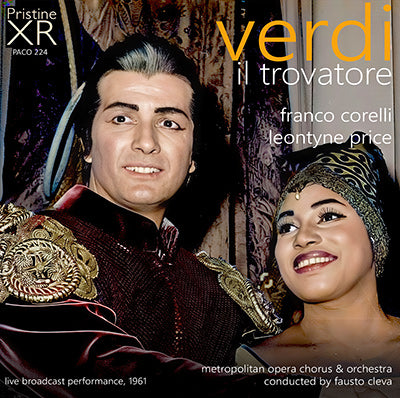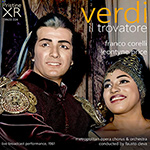
This album is included in the following sets:
This set contains the following albums:
- Producer's Note
- Full Track Listing
- Cover Art
On Friday 27 January 1961 two singers made their Metropolitan Opera debuts in Il Trovatore, Leontyne Price and Franco Corelli. The audience reaction was stupendous, some timing the final curtain calls as lasting over 40 minutes. Price and Corelli would go on to become two of the most beloved, and bankable, stars on the Met roster. Just over a week after their debuts, the large radio audience had the thrill of hearing them for themselves for the first time.
While Leontyne Price was not the first black singer to appear in a principal role at the Met, Marion Anderson had broken that particular colour bar in 1955, followed a few weeks later by baritone Robert McFerrin, Price was the first to embark on a long and distinguished career with the company. Price grew up in segregated Mississippi and broke numerous social taboos simply by the power and beauty of her voice. In the mid-1950s she appeared in several NBC-TV adaptations of operas, including Tosca, making her the first African-American to sing a leading role in a televised opera. She began to be noticed by famous European conductors, most notably Herbert von Karajan. Rudolf Bing, the Met’s general manager saw her with Corelli in Il Trovatore in Verona in the summer of 1959 and invited both to the Met during the 1960-61 season. Price was a versatile singer, appearing in a wide range of roles from the classical to the modern (she premiered Samuel Barber’s Antony and Cleopatra for the opening of the New Metropolitan Opera House at Lincoln Center in 1966) but she was particular outstanding as a Verdi heroine with numerous broadcasts of Aïda, Un Ballo in Maschera, and La Forza del Destino. Paul Jackson neatly summarises his reaction to hearing this broadcast of Il Trovatore: “One can only marvel at the incredible beauty of her voice, the surety of her technique and the authority of her performance.” It is undoubtedly one of the best Leonoras ever heard in the opera house.
Italian tenor Franco Corelli provides the perfect foil for Price as Manrico. Corelli had made a name for himself in heroic tenor roles in Europe during the 1950s, singing opposite world-famous sopranos such as Maria Callas, Renata Tebaldi, Zinka Milanov, and Maria Caniglia. His matinee idol good looks certainly helped his career, but it was his voice that ensured that he would have an international career. Undoubtedly the voice is large, with ringing high notes that soar out over the largest of orchestras, and it has a real Italianate singhiozzare (sob) when needed. But Corelli was also capable of taming and controlling his voice when needed. He was one of the few singers who could achieve the written diminuendo at the end of “Celeste Aïda” for example, and what he offers in this broadcast is not only abundant thrills but also real character.
It was no less than Enrico Caruso who said that Il Trovatore required the four greatest singers in the world to be a success, and this performance is a testament to that due to the Count di Luna of Mario Sereni and the Azucena of Irene Dalis. Mario Sereni, the Count di Luna in this broadcast, was a last-minute
substitution for an indisposed Robert Merrill, who had sung in the first
performance a week earlier. He had a long and distinguished career at the Met between 1957 and 1984, singing many leading baritone roles in Italian and French opera. This is the first time he appeared with both Price and Corelli at the Met but he would go on to sing with them in Aïda, La Forza del Destino and Ernani. Irene Dalis enjoyed a 28-year career at the Met singing a wide variety of roles, including the Nurse in the Metropolitan Opera premiere of Richard Strauss’ Die Frau ohne Schatten in 1966, but she was most often heard in Verdi mezzo roles such as Amneris, Princess Eboli and Azucena.
The New York Times ended its review of the performance like this: “Taken as a whole, then, this was an exciting "Trovatore," with Fausto Cleva pacing the performance with his usual skill and understanding. It brought to the fore a brilliant new soprano - new to the Metropolitan, that is - and a tenor of great potential. Both will continue to be active this season, and to say that their appearances will be watched with interest is putting it mildly.” I think we might go even further and state with confidence that this was a thrilling afternoon for everyone fortunate enough to hear it at the time, and for those who will hear it now for the time in Pristine’s new XR remastering of this historic broadcast.
VERDI Il Trovatore
disc one (67:18)
1. RADIO Introduction - Milton Cross (1:09)
act one, scene one
2. All'erta! All'erta! (2:57)
3. Di due figli vivea padre beato (0:42)
4. Abbietta zingara, fosca vegliarda! (3:28)
5. Brevi e tristi giorni visse (1:55)
6. Sull'orlo dei tetti (1:36)
act one, scene two
7. Che più t'arresti? (1:57)
8. Tacea la notte placida (3:30)
9. Quanto narrasti di turbamento m'ha piena l'alma! (0:52)
10. Di tale amor (1:57)
11. Tace la notte! (1:41)
12. Il Trovator! Io fremo! Deserto sulla terra (1:40)
13. Anima mia! Pi dell'usato (1:50)
14. Di geloso amor sprezzato (2:56)
act two, scene one
15. Vedi! le fosche notturne spoglie (2:46)
16. Stride le vampa! (2:50)
17. Mesta è la tua canzon! (2:00)
18. Sol or siamo (0:52)
19. Condotta ell'era in ceppi (4:54)
20. Non son tuo figlio! (2:30)
21. Mal reggendo all'aspro assalto (3:12)
22. L'usato messo Ruiz invia! (1:21)
23. Perigliarti ancor languente (2:12)
act two, scene two
24. Tutto è deserto (1:33)
25. Il balen del suo sorriso (3:06)
26. Qual suono! Oh ciel! (0:44)
27. Per me ora fatale (1:53)
28. Ah! se l'error t'ingombra (2:21)
29. Perch piangete? O dolci amiche (2:33)
30. E deggio e posso crederlo? (4:23)
disc two (64:41)
act three, scene one
1. Or co' dadi, ma fra poco (4:28)
2. In braccio al mio rival! (2:05)
3. Giorni poveri vivea (2:52)
4. Deh! rallentate, o barbari (1:46)
act three, scene two
5. Quale d'armi fragor (2:14)
6. Ah sì, ben mio, coll'essere io tuo (3:58)
7. L'onda de' suoni mistici pura discenda al cor! (1:45)
8. Di quella pira, l'orrendo foco (2:26)
act four, scene one
9. Siam giunti; oecco la torre (3:10)
10. D'amor sull'ali rosee (4:56)
11. Misere, Quel suon, quelle preci (4:59)
12. Udiste? (1:45)
13. Mira, d'acerbe lagrime (1:57)
14. Conte! Né basti! (1:10)
15. Colui vivrà - Vivrà! Contende il giubilo (2:40)
act four, scene two
16. Madre, no dormi? (5:18)
17. Sì, la stanchezza m'opprime (1:12)
18. Ai nostri monti ritorneremo (2:15)
19. Che! Non m'inganna (1:06)
20. Parlar non vuoi? Ha quest'infame l'amor venduto (2:54)
21. Ti scosta! (1:01)
22. Prima che d'altri vivere (3:27)
23. RADIO Closing announcements - Milton Cross (5:16)
Metropolitan Opera Chorus & Orchestra
conducted by Fausto Cleva
CAST
Manrico - Franco Corelli
Leonora - Leontyne Price
Azucena - Irene Dalis
Conte di Luna - Mario Sereni
Ferrando - William Wilderman
Ines - Teresa Stratas
Ruiz - Charles Anthony
Un vecchio zingaro - Carlo Tomanelli
Un messo - Robert Nagy
Live radio broadcast from the Metropolitan Opera, New York, 4 February 1961
Announcer: Milton Cross
Ambient Stereo XR remastering: Andrew Rose
Cover artwork: Franco Corelli & Leontyne Price in Il Trovatore, Metropolitan Opera, 1961
Total duration: 2hr 11:59

